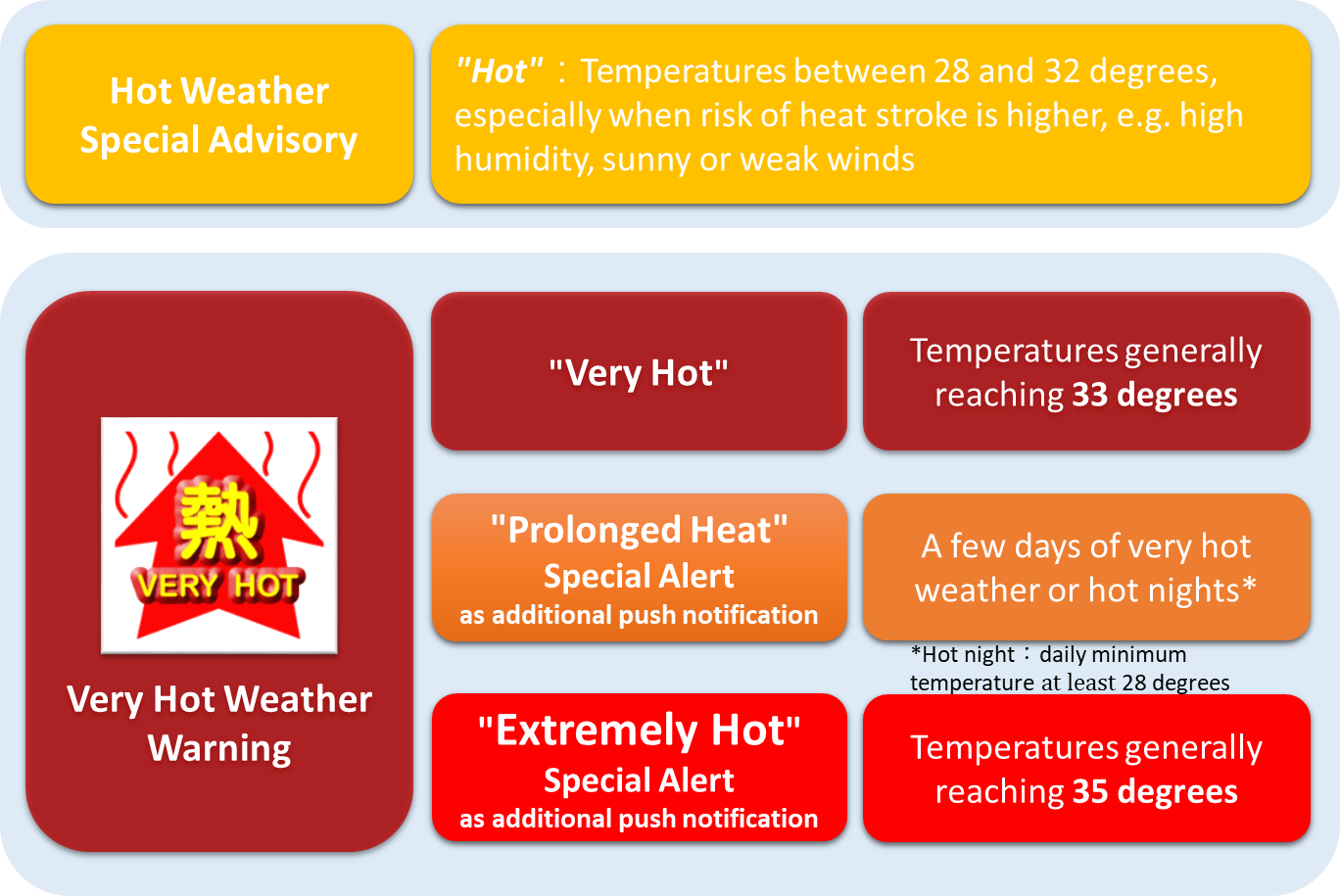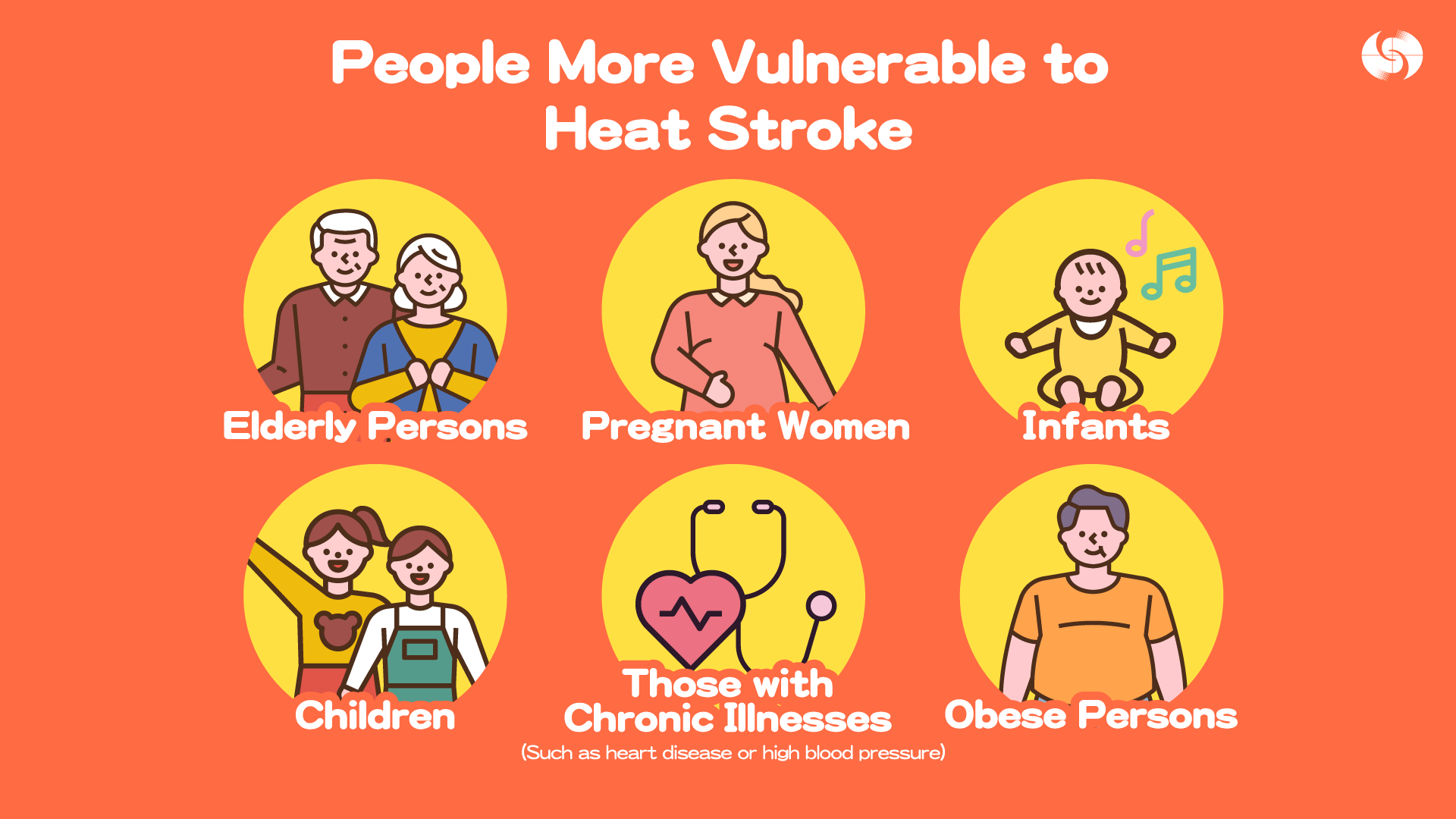Beware of Health Effects of Extremely Hot Weather
CHONG Sze-ning and LAW Hiu-fai
December 2023
The impact of very hot weather on health cannot be ignored. Are we ready to deal with it? Let us first explain the heat-related alerts or warnings issued by the Observatory (Figure 1):
Figure 1 Heat related alerts and warnings issued by the Observatory at a glance.
When the weather becomes hot, especially when temperature is high, humidity is high and winds are weak, the public should take appropriate precautions to reduce the risk of heat stroke. When such weather conditions are expected, the Observatory will issue the "Hot Weather Special Advisory" to remind members of the public to prepare for hot weather.
When Hong Kong is expected to be affected by very hot weather, the Observatory issues the Very Hot Weather Warning (VHWW) to alert members of the public to beware of heat stroke and take precautionary measures. Under prolonged heat condition or weather generally becomes extremely hot, the Observatory will also issue the following Special Weather Tips as necessary when the VHWW is in effect:
• “Prolonged Heat” Special Alert – To be issued when a few days of high temperatures (very hot days or hot nights[1] ) are encountered in Hong Kong to alert members of the public to drink adequate water, take rest and seek help immediately if feeling unwell, and seek medical advice as soon as possible if necessary.
• “Extremely Hot Weather” Special Alert – To be issued if the temperature generally reaches extreme level (35 degrees or above) to alert the public of the extremely hot weather, and to pay due attention to health conditions, drink more water, and take all necessary protective measures. Seek medical advice as soon as possible if feeling unwell.
The above messages will be disseminated through the Observatory's website, the "MyObservatory" mobile application, TV and radio broadcasts. App users can also opt for receiving push notifications. People who are more vulnerable to heat stroke (Figure 2) should stay particularly vigilant or need more care. They should drink more water and take all necessary protective measures to prevent discomforts caused by very hot weather, and pay due attention to health conditions. Under extremely hot weather, vigorous physical activities should be avoided. Other
measures against the heat and
measures for sun protection should not be ignored. For more information on protection against the heat, please visit the following websites (with links):
• The HKO on precautions of the Very Hot Weather Warning
• The Department of Health "Beware of Heat Stroke"
• The Labour Department "Prevention of Heat Stroke at Work"
• The Home Affairs Department on temporary heat shelters
Figure 2 Elderly persons, pregnant women, infants and children, those with chronic illnesses, such as heart disease or high blood pressure, as well as obese persons are more vulnerable to heat stroke. Watch out for any relevant symptoms.
In addition to temperature, other factors such as moisture, winds and solar radiation can affect heat stress and the risk of heat stroke as well. Therefore, the Observatory established the "Hong Kong Heat Index" (HKHI) which comprehensively considers temperature, humidity, airflow and solar radiation. According to the joint study by the Observatory and a local university, the public should take appropriate precautions when the HKHI at King’s Park is around 30 or above to avoid health effects caused by hot weather.
The HKHI is not temperature but an index that takes into account the aforementioned factors. Under the same temperature conditions, the HKHI will be lower with lower humidity, weaker solar radiation, or stronger winds. For example, on 14 September 2022, it was sunny and very dry in Hong Kong with a maximum temperature of 35.5 degrees Celsius recorded at the Observatory. The highest HKHI was only 27.5 as the daily average relative humidity was just 44% at King’s Park. On the other hand, the HKHI will be higher under conditions of higher humidity, scorching sun, and lighter winds. For example, Hong Kong had a higher relative humidity under the influence of a southwesterly airstream on 12 August 2019. The maximum temperature recorded by the Observatory was 34.0 degrees, not reaching the extremely hot level. However, the maximum HKHI at King’s Park reached 32.4 and the average relative humidity at King’s Park that day was 82%. The HKHI is composed of multiple elements and is affected by changes in multiple factors. Among them, the value of solar radiation varies due to cloud cover or showers with higher fluctuations. There are still limitations in accurately predicting the index by computer forecasting models.
In summer, everyone should pay more attention to heat related alerts or warnings from the Observatory and take all necessary protective measures against the heat and the sun. Those who are more vulnerable to heat stroke should pay special attention to prevent discomforts caused by the heat.
Reference:
[1] Daily minimum temperature reaching 28 degrees or above.

